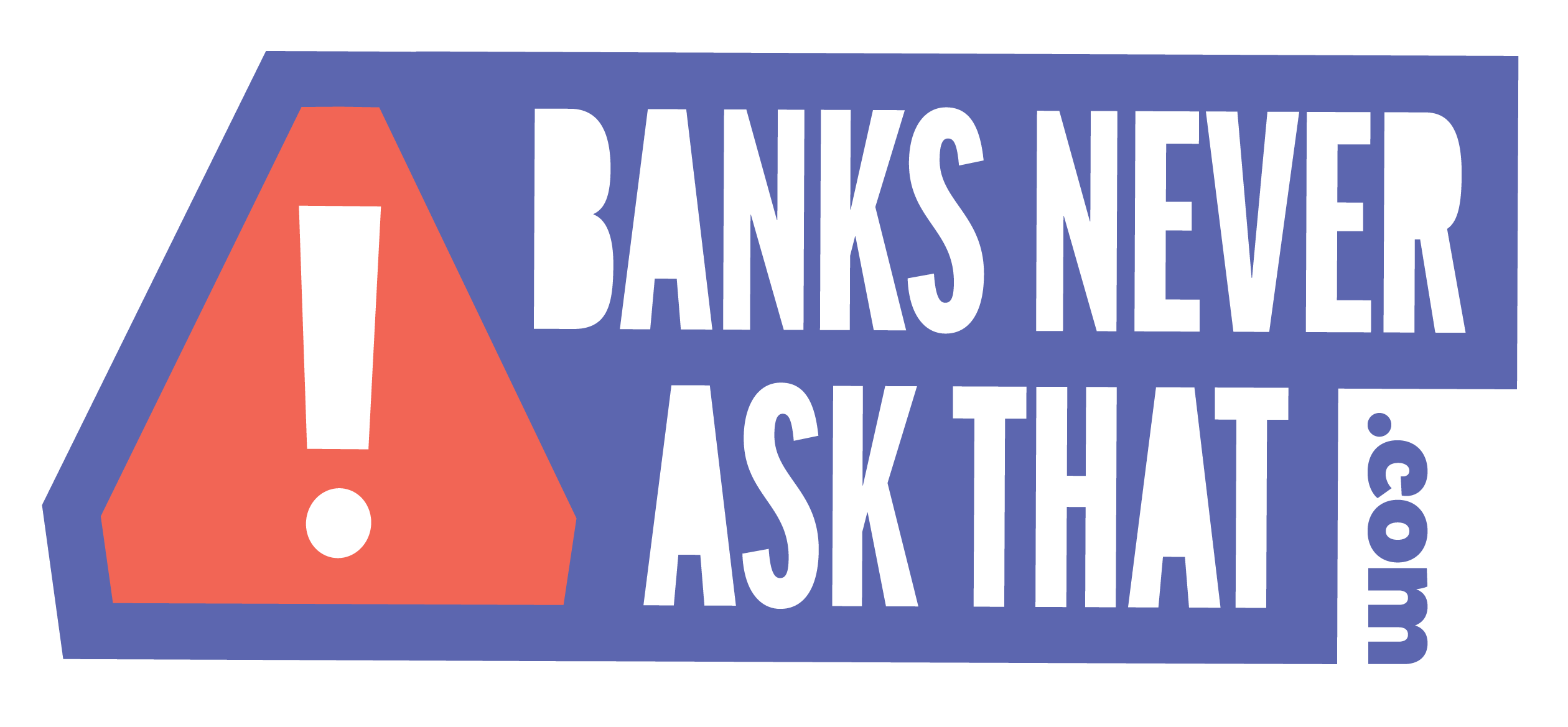YOUR Security Is OUR Priority
Century Bank of Georgia will NEVER call, text, or email you asking you to verify personal information such as your SSN, PIN, account number, card number, or online banking login information.
Helpful Tips to spot scams - Remember “Banks Never Ask That.”
- If you receive an email, text, or phone call asking for confidential information, it’s a definite red flag. It’s better to be safe than sorry. End the call, delete the text, and trash the email because banks never ask that!
- You may be asked to verify confidential information if you call your bank, but never vice versa. If you receive an incoming call from someone claiming to be your bank, the safest thing you can do is hang up and call your bank’s customer service number.
Learn More at: BanksNeverAskThat.com
{beginAccordion}
Scam Prevention Resources
Not all scams are the same! Protect yourself, your business, and your loved ones with these resources for preventing common types of fraud from our most reliable sources. Check them out, share them, and never forget them!
Small Business Security Guide (FTC.gov)
When scammers go after your business, it can hurt your reputation and bottom line. Your best protection? Learn these signs of scams that target businesses and share them with your employees and colleagues! Learn More >>
Elderly Exploitation Prevention (ABA Foundation)
Financial abuse of older Americans is a growing crime, and it’s essential to learn how to protect this demographic from financial exploitation. Learn more with these tips to prevent Elder Financial Abuse! Learn More >>
Spoofing and Phishing (FBI.gov)
Spoofing is when someone disguises an email address, sender name, phone number, or website URL—often just by changing one letter, symbol, or number—to convince you they are a trusted source. They often lead you to a fake website used solely to steal your information. Become an expert in spotting these spoofs with these tips! Learn More >>
Imposter Scams (ABA Foundation)
Imposter scams often begin with a call, text, or email, and they all work the same way – a scammer pretends to be someone you trust. Protect yourself and your dough with these tips to avoid falling victim to these scams. Learn More >>
Online Dating Safety (ABA Foundation)
Has an online love interest asked you for money? That’s a scam! Keep yourself and your personal information safe with these tips for avoiding common online dating scams. Learn More >>
Mobile Payment App Security Tips (ABA Foundation)
Mobile Payment Apps can be a highly convenient form of payment! Use them safely because once you send money, it’s nearly impossible to get it back. Protect yourself and your information with these tips on safely using mobile payment apps and services Learn More >>
Money Mule Scams (ABA Foundation)
If someone sends you money and asks you to send it to someone else, STOP. It could be a scammer using you as a “money mule” to transfer and launder stolen money. Check out these tips to avoid falling victim to money mule scams. Learn More >>
Warning Signs of Identity Theft (FTC.gov)
Once identity thieves have your personal information, they can drain your bank account, run up charges on your credit cards, and more without your knowledge. Learn more about spotting warning signs before it’s too late! Learn More >>
Other Helpful Resources
Whether you need to file a formal complaint regarding scams or fraud you’ve experienced online and off or find more information to protect yourself; these additional resources can help!
Internet Crime Complaint Center: ic3.gov
Consumer Fraud (Department of Justice Homepage): justice.gov
Federal Trade Commission (FTC) Consumer Response Center: ftc.gov
Consumer Guides and Protection: usa.gov
On Guard Online: consumer.ftc.gov
Do Not Call Registry: donotcall.gov
Better Business Bureau: bbb.org
Reviewing your credit report at least annually can also help spot suspicious or unknown transactions. The Credit Bureau will provide one free credit report per year from each of the three major credit bureaus at www.annualcreditreport.com.
- For a small fee you can request a credit report anytime directly from:
- Equifax: www.equifax.com
- Experian: www.experian.com
- TransUnion: www.transunion.com
Bank Security Information
At Century Bank of Georgia, your online safety is our top priority. Our system ensures that data exchanged between our computers and your PC is encrypted with 128-bit encryption. Your information then passes through a “firewall,” which is specifically designed to keep out unauthorized users. The firewall controls and limits outside access to the banks’ internal database. Our firewall is set up to block unauthorized traffic so you can feel confident that your information is secure while banking at Century Bank of Georgia.
During your enrollment process, you will set up your unique user ID, security questions, and password. The combination of your unique user ID and password enables you to be uniquely identified to Century Bank’s online banking. It is your responsibility to keep your password secure. Your password should not be shared with anyone.
{endAccordion}
If you receive a suspicious call, text, or email, even if it appears to be from Century Bank of Georgia, please contact us at (770) 387-1922 immediately for verification.
